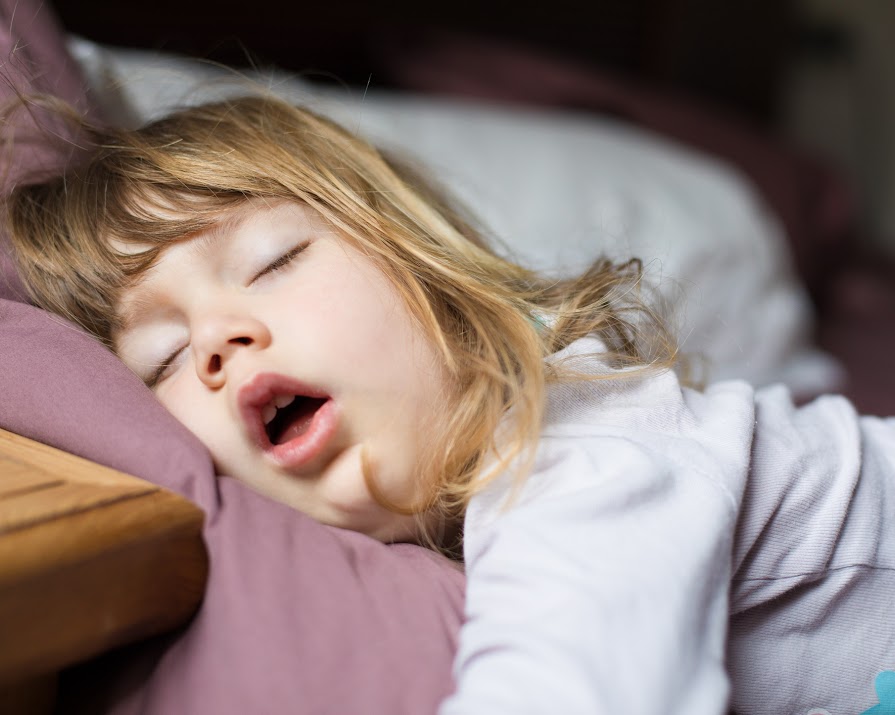By Grace McGettigan
28th Aug 2019
28th Aug 2019
bedtime child sleep routine for school
With the new school year upon us, it’s time to get the little ones into a regular bedtime routine. We asked Tanya Vasey, the lead clinical sleep physiologist at the Mater Private Sleep Laboratory, for advice
Their uniforms are ironed, their lunchboxes packed and school shoes freshly polished – but how to get them out of bed at 7 am? That might prove difficult.
All summer long, children of all ages have enjoyed sleeping in each morning and staying up late at night. Now, whether they’re starting first class or first year, it’s time to get them into a routine.
Tanya Vasey, the lead clinical sleep physiologist at the Mater Private Sleep Laboratory, has shared expert advice on how to establish a good bedtime routine for your little ones.
Importance of sleep for children
Your child’s age will determine how much sleep they need at night; regardless of their level of activity during the day.
Tanya says, “Preschool children aged three to five years need 10-13 hours; children aged six to 13 years need eight-10 hours, and those aged 14 to 17 years need eight-10 hours sleep for normal development.”
These numbers aren’t just made up. It’s scientifically proven that a consistent bedtime routine (whereby the child falls asleep and stays asleep for the required amount of time for their age group) is key in their behavioural and emotional development. “Children need a good night’s sleep in order to develop and learn,” Tanya says.
“Consistent sleep deprivation with time can falsely present itself as a behavioural issue, such as ADHD, due to simply being overtired”
“There are so many things that go on during sleep to help our bodies stay healthy, but in children especially, sleep induces the release of growth hormone. In sleep-deprived children, a lack of growth is observed,” she adds.
Sleep is also essential for children to form memories of the things they are learning each day; with sleepy children more likely to lack concentration and act impulsively as a result of their tiredness.
“Consistent sleep deprivation with time can falsely present itself as a behavioural issue, such as ADHD, due to simply being overtired,” Tanya explains. “Children will also likely gain weight as a result of sleep deprivation, due to an increased desire for snacking on high energy foods”.
But how can we get them to sleep on time, not to mention wake on time for school?
Screen time vs children’s sleep
“Always have a wind-down time,” advises Tanya. “Playing video games or watching Youtube fuels a child’s brain with dopamine, which is the chemical that makes us want to do things we enjoy over and over again. Trying to get off to sleep after a blast of dopamine can be difficult.
“Also, we are exposed to so much more light today, from screens to street lamps. Light prevents our brain from creating melatonin, and melatonin is what it needs in order to know it’s bedtime”.
To combat this, and to encourage our brains to produce melatonin, Tanya says, “Eliminate screens 30-60 minutes before bed, close the blinds and turn down some lights.
“TVs and video games in the bedroom are a distraction from the room’s intended purpose”
“This is a perfect time to encourage reading or to do some colouring, or even to play a quiet game of Go Fish (you’ll find your kids will be yawning and rubbing their eyes into the first couple of hands). After all, they are tired and this quiet time helps their brain to process how tired their bodies actually are.”
If your child is used to staying up really late, it’s worth moving their bedtime forward by 15 minutes every three nights. That way they’ll slip into the new routine gradually and naturally. Then, come morning, set a consistent wake-up time and open their curtains right away.
A ‘sleep-friendly’ bedroom
Did you know the space in which your child goes to sleep can impact the quality of their sleep?
“It’s not always realistic to ask a child to have a clean and tidy bedroom with no distractions. Children have toys and trophies and all kinds of mementos lying around,” says Tanya, but that being said, “Keep things to a minimum and tidy toys away as best you can”.
What’s more, Tanya recommends, “The bed should be neatly made and kept tidy so it’s a nice experience getting into at the end of the day, which they will remember.
“If the child is using their bed to study, or lying on their bed while looking at a screen, this will train their brain away from using the bed to sleep”
“TVs and video games in the bedroom are a distraction from the room’s intended purpose,” she adds. “If the child is using their bed to study, or lying on their bed while looking at a screen, this will train their brain away from using the bed to sleep.
“Finally, keep the room dark with blinds or curtains and make sure it isn’t too warm. Our bodies need to cool down to induce sleep,” she explains.
As a parting note, Tanya says good bedtime routines (and ensuring some downtime takes place before bed) will help guide children in the right direction.
It’s important to note, however, if you feel your child is not getting enough sleep (or their sleep quality is not what it should be), ensure proper routines are in place. Always seek help from your GP if you think they may have a sleeping disorder preventing them from getting a restful night.
Tanya Vasey is the Lead Clinical Physiologist at the Mater Private Sleep Laboratory.
Photo: Getty
Read more: How to deal with an anxious child at back-to-school time
Read more: Why having a proper ‘bedtime’ as an adult is the key to a great night’s sleep
Read more: Things Fall Apart: A message to all the tired parents out there























